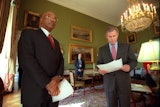Despite his meteoric rise through the ranks of academia, Dr. James L. Moore III, isn’t shy about reminding anyone who he comes into contact with, that he’s a product of South Carolina.
“All that I am and that I hope to be is shaped by my experience growing up in South Carolina,” Moore told the audience of several hundred at the American Educational Research Association’s 2017 luncheon, where he was presented with the mid-career Scholar of Color award. “And I want to recognize the village that nurtured me, loved me and cared for me so that I am at this point in my career.”
 Dr. James L. Moore, III
Dr. James L. Moore, IIIIt must have been humbling then, when Moore was included along with 11 other influential African-American figures in the South Carolina African-American Heritage Calendar last year.
The calendar, which Moore read as a child, is distributed each year to about 100,000 children across the Palmetto State and has included iconic African-Americans who hail from the state, such as the Reverend Jesse L. Jackson, Marian Wright Edelman and the late Dr. Benjamin E. Mays.
“My mother, many years ago when I was in undergrad, used to send care packages and write notes and she said, ‘Son, look at this calendar … look at all these wonderful African-Americans from my beloved South Carolina. Someday son, I can see you being in that calendar,’” Moore recalled in an interview with Diverse last year. “And that’s what made that calendar so significant. She’s not here in the flesh, but it was a testimonial to what my mom saw in me.”
Born and raised in Lyman, South Carolina, a small blue-collar mill town, Moore left the state to head to Delaware State University, where he had plans to someday play football professionally. But after he suffered an injury, he turned his full attention to his studies, becoming an English education major. He became inspired when he learned that Dr. John McFadden had been named the Benjamin E. Mays Distinguished Professor at the University of South Carolina — the first African-American scholar in the history of the school to be endowed with a professorship.
“That was striking to me,” says Moore. “It was a paradigm shift for me. I said, ‘Wow, I want to carve out a scholarly career in which I am able to make a difference in my community and beyond.”
He went on to earn his doctorate in counselor education from Virginia Tech.
Now, Moore is the inaugural Education and Human Ecology (EHE) Distinguished Professor of Urban Education in the Department of Educational Studies at The Ohio State University (OSU) and concurrently serves as the vice provost for Diversity and Inclusion and the university’s chief diversity officer. He is also the executive director of OSUs’ Todd Anthony Bell National Resource Center on the African-American Male.
In addition to his many administrative duties, Moore has kept up a robust research agenda, churning out dozens of articles, book chapters and edited books and delivering more than 200 research and scholarly lectures.
As an instructor, Moore has taught a variety of classes ranging from Introduction to Counseling, Transcultural Issues and Strategies in School Counseling to Multicultural Issues in Counseling.
From 2005 to 2017, Moore served as a program director for Broadening Participation in Engineering at the National Science Foundation.
Dr. Desireé Vega, an assistant professor of School Psychology at the University of Arizona, has known Moore for a decade. He served on her dissertation committee at OSU.
“He saw potential in me that I did not always see in myself,” says Vega. “He took me under his wing to ensure I was thoroughly prepared to be a professor — something I was not so sure of as a graduate student.”
Vega says that Moore provided her with invaluable mentorship across the years.
“As a faculty member today, Dr. Moore continues to play a key role in my professional development,” she says, adding that he shares opportunities and experiences that will enhance her career.
“Additionally, the mentorship he provided me inspires me to be an effective mentor and champion for my doctoral students.”
Moore says that he has been afforded immense opportunities at OSU to execute a research agenda that is closely aligned to his personal values, adding that OSU’s College of Education and Human Ecology has a total of four faculty members who were honored to receive a distinguished professorship.
“In my opinion, it recognizes the significance of my work and my impact in higher education,” says Moore. “Although I have achieved much success in my career, there is still room for even more. I believe being a professor is one of the best jobs in the world. I am honored to have the opportunity to conduct research on topics that I am very passionate about. My research has created greater opportunities for me in higher education and beyond.”
Jamal Eric Watson can be reached at jwatson1@diverseeducation.com. You can follow him on Twitter @jamalericwatson.
This article appeared in the September 20, 2018 edition of Diverse. This is one in a series of profiles about distinguished professors of education.
















